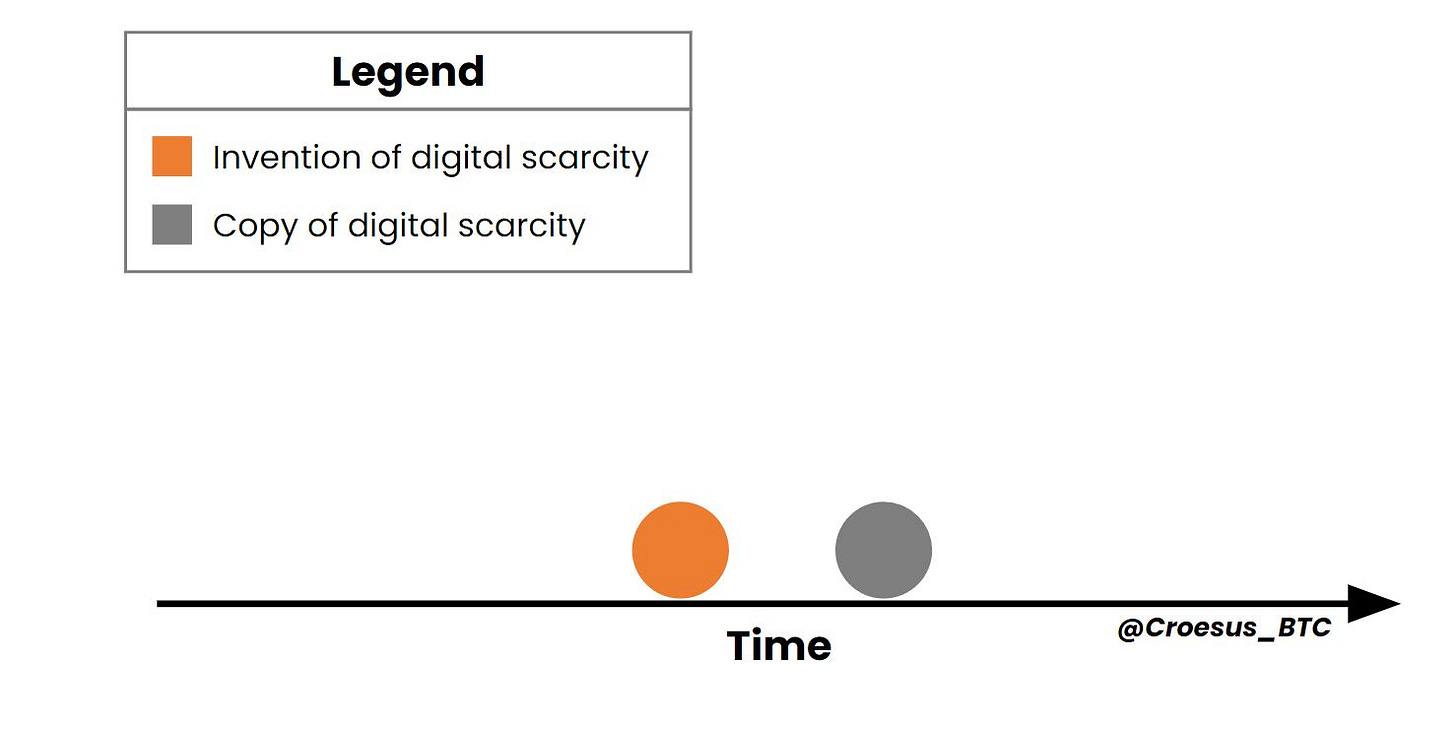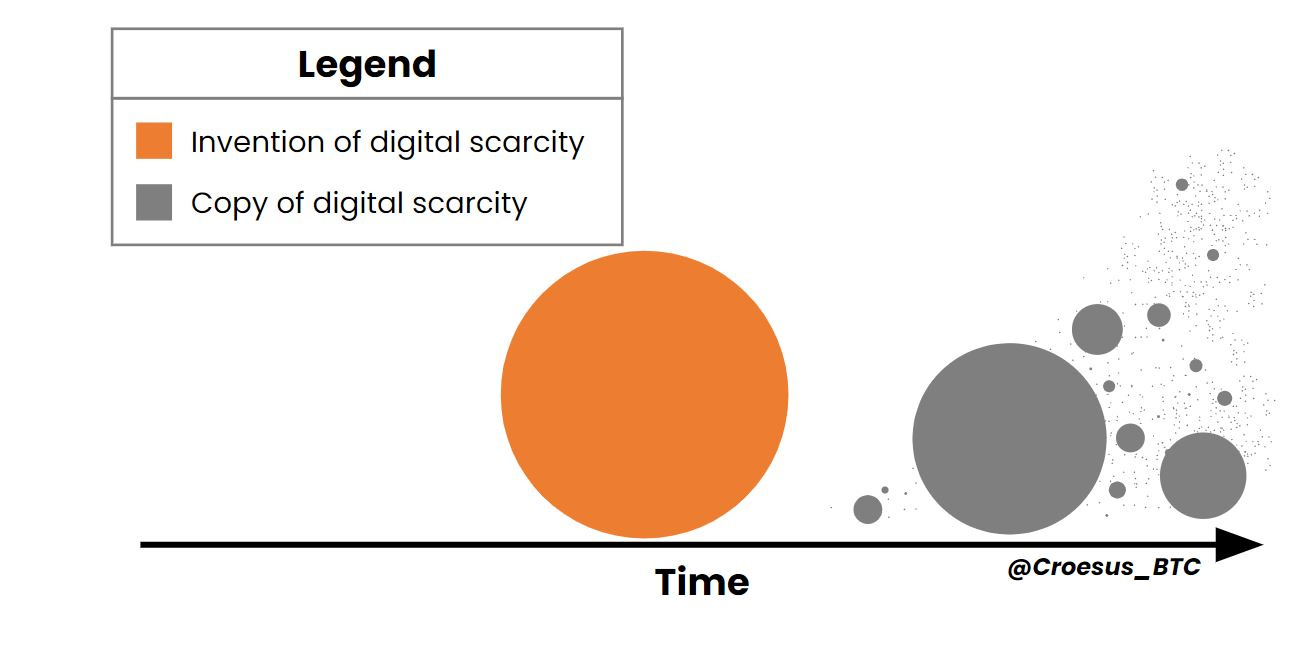The Crypto Catch-22: Why Bitcoin Only
Three key reasons why Bitcoin is the only cryptoasset worth holding
Everyone learns the hard way. I certainly did. When we first take interest in cryptocurrencies, we naturally explore what’s out there. Everything sounds exciting, some of it even compelling.
So we diversify, thinking that’s the prudent thing to do. But, invariably, the more you proactively learn or the longer you stay in the market, the stronger your understanding grows that there’s only one asset here worth holding: Bitcoin.
If you are new to cryptocurrencies, a lot of pain and heartache can be spared if you lean in to understanding why.
Here are the three key reasons why Bitcoin is the only cryptoasset worth holding:
Digital scarcity is a one-time phenomenon
Money is the mother of all network effects & tends to one
The Crypto Catch-22 precludes any genuine competition to Bitcoin
Considering these topics could be the difference between cementing a Bitcoin fortune or squandering the massive opportunity before you. Let’s dig in…
Digital scarcity is a one-time phenomenon
You can’t store value on the internet. The internet is just information - expressed as 0s and 1s - translated by your computer into words and images. The problem with information is that it can be copied & pasted. That’s the defining attribute of information — it is dematerialized, which grants it the incredible dual characteristics of speed-of-light transmission & infinite replicability.
But this replicability doesn’t work for value.
For value to exist natively on the internet, there needed to be a finite system within the unbounded internet expanse, one whose architecture tamed informational replicability in order to create a system of digital scarcity.
And that was the breakthrough invention of Bitcoin.
The reason you can’t copy and paste Bitcoin is that a Bitcoin is not a jpeg made up of 0s and 1s. Instead, when you own a Bitcoin, what you really own is the consensus view of every computer on the Bitcoin network that you have authority over 1/21M of the Bitcoin supply. In that sense, you don’t own anything tangible; you own an inalienable property right. And ultimately, that is the essence of value — unilateral control over something finite.
This system of value consensus comes with a minor problem. Although it is impossible to copy value within the confines of this walled-garden system, it is still possible to copy & paste the entire system.
And of course, information that can be copied… can be replicated infinitely. There is minimal marginal cost to spinning up a brand-new copy of the original system. And that’s what we’ve seen in digital assets. Bitcoin is the original instance of a system of digital scarcity. Every other cryptocurrency is a copy of this system of digital scarcity, dressed up with various bells and whistles to make it seem different, new, and better.
When I first made this graphic in 2021 to highlight the endlessly replicable nature of cryptocurrencies, there were ~7,000 total cryptocurrencies. Now, there are ~30,000. 4x more in just 2 years.
In that sense, if someone purchased a fixed % of a new cryptocurrency in 2021 that featured no supply dilution over time… their % ownership of the total supply in the “copy of digital scarcity” market has still been diluted 4x. That’s 75% debasement in just 2 years.
Granted, this assumes that all crypto projects are equally valuable. Now let’s consider the realities of value…
Money is the mother of all network effects and tends to one
Network effects apply whenever the value of a system increases as the number of users increases. (Telephones, the internet, Facebook, etc.) Metcalfe's Law describes the value of a network as proportional to users^2.
Money is the mother of all network effects — we gain wealth by choosing to value the form of money that others value, and we lose wealth if we choose wrong. (Beanie babies, tulips, NFTs.) Because of this pressure, money tends to one.
That is why gold emerged as the singular worldwide monetary standard after 70,000+ years of free market experimentation with various commodities as money. It was the hardest commodity to make more of and therefore the most reliable store-of-value for hard-earned wealth.
The result of this is that humans store ~40x more wealth in gold (~$12T total value) than the #2 store-of-value commodity, silver (~$300B total value).
This is called a Schelling Point, a game theoretic focal point. When humans store wealth, they intrinsically select a store-of-value that they anticipate others will value in the future.
With that in mind, let’s update our graphic above to show the relative valuation of existing cryptocurrencies, represented by the size of each circle.
Consider what would happen if you showed the graphic above to 100 people and asked them to pick which circle was most valuable. Better yet, which circle they thought the other 99 people would pick. That’s the Schelling Point, whether or not market participants have realized it yet.
The Crypto Catch-22
Aside from Bitcoin’s strengths as the singular digital scarcity & dominant network effect, it’s worth reflecting on the weakness of Bitcoin’s competition.
While the marketing for any particular cryptocurrency will highlight its feature set and flashy specs, these all amount to bells and whistles. What matters is a simple question: which asset do people choose to hold as a store-of-value? Bitcoin has a big lead.
As such, every altcoin created since Bitcoin has been playing catchup. And yet, what is required in order to catch up precludes any altcoin from being a genuine competitor to Bitcoin.
In the celebrated satirical war novel, Catch-22, the protagonist wrestles with an air-tight paradox of military policy: if a soldier has gone crazy, he doesn’t have to go on missions; but, a crazy soldier has to request to be excused, and this request demonstrates that he is not crazy.
Well, every upstart project in the crypto landscape faces their own impossible paradox as they attempt to catch up to Bitcoin – the Crypto Catch-22:
You can’t catch Bitcoin without a leadership team and a marketing budget
With a leadership team and marketing budget, you are a company masquerading as a decentralized protocol
The end result of this is quite clear: almost every one of the 30,000 crypto projects trying to get a foothold in the market is, to use SEC Chairman Gary Gensler’s pet term, a DINO project (“decentralized in name only”). They have leadership teams working to guide the project with the objective of delivering an investment return for holders of their crypto token. By the unambiguous definition of the Howey Test, this means they are companies offering unlicensed securities.
This violates securities law, and in all of these cases… there’s a centralized leadership team that the SEC can hold responsible.
And indeed, we have now entered the era of enforcement. Just this week, the SEC sued the exquisitely obnoxious founder of HEX for 3 counts of securities fraud & told Coinbase’s CEO that “every [crypto] asset other than Bitcoin is a security.”
To summarize:
Bitcoin is the invention of digital scarcity & every cryptocurrency since is a replica copy of that system
Money is the mother of all network effects & Bitcoin has already won
All challengers to Bitcoin are ultimately companies promoting unlicensed securities offerings & the SEC is coming after them
Now, with your hard-earned money at stake, pick which circle others will value most. But don’t take too long, because 99% of the world is currently making the same decision.
If you read this far, you have a choice now:
Leave this page & forget how to find my work again, OR
Get next week’s Bitcoin newsletter. My goal is to help you understand why Bitcoin could be the key to growing your wealth this decade: 👇👇👇
This post was made to be forwarded to friends & family to show why Bitcoin, not “crypto.”
Want your friends & family to receive “Once-in-a-Species” posts? I’ll do my best to orange pill those holdouts in your life, just nudge them to sign up!








Catch 22 doesn't really explain anything here.. it's kind of a lame analogy, to be honest. The network effect is why other crypto currencies, even ones with limited supply like Litecoin, can't catch up to Bitcoin. You can't just throw any analogy and fit it in with bitcoin.. feels like clickbait.
Clear article, thanks a lot. SoV aka digital gold is clear. What about Ethereum with its smart contracts capabilities? I do like the DeFi it allows. Does ETH (not shitcoins) have differentiated and added features to no longer just be a copy?
With BTC winning as SoV it won’t make Ethereum disappear. Can’t they coexist?